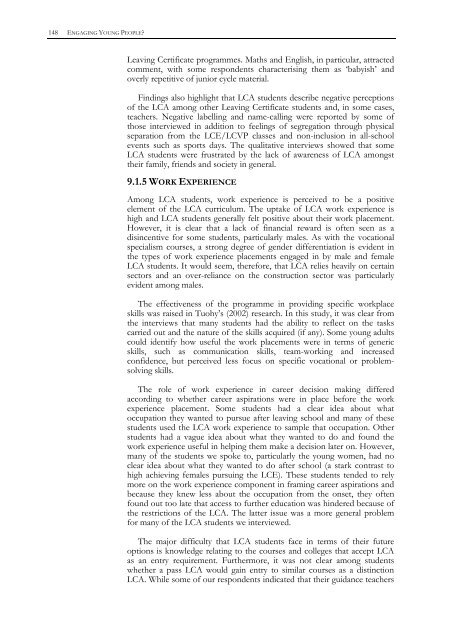Student Experiences of the Leaving Certificate Applied Programme
Student Experiences of the Leaving Certificate Applied Programme
Student Experiences of the Leaving Certificate Applied Programme
You also want an ePaper? Increase the reach of your titles
YUMPU automatically turns print PDFs into web optimized ePapers that Google loves.
148 ENGAGING YOUNG PEOPLE?<strong>Leaving</strong> <strong>Certificate</strong> programmes. Maths and English, in particular, attractedcomment, with some respondents characterising <strong>the</strong>m as ‘babyish’ andoverly repetitive <strong>of</strong> junior cycle material.Findings also highlight that LCA students describe negative perceptions<strong>of</strong> <strong>the</strong> LCA among o<strong>the</strong>r <strong>Leaving</strong> <strong>Certificate</strong> students and, in some cases,teachers. Negative labelling and name-calling were reported by some <strong>of</strong>those interviewed in addition to feelings <strong>of</strong> segregation through physicalseparation from <strong>the</strong> LCE/LCVP classes and non-inclusion in all-schoolevents such as sports days. The qualitative interviews showed that someLCA students were frustrated by <strong>the</strong> lack <strong>of</strong> awareness <strong>of</strong> LCA amongst<strong>the</strong>ir family, friends and society in general.9.1.5 WORK EXPERIENCEAmong LCA students, work experience is perceived to be a positiveelement <strong>of</strong> <strong>the</strong> LCA curriculum. The uptake <strong>of</strong> LCA work experience ishigh and LCA students generally felt positive about <strong>the</strong>ir work placement.However, it is clear that a lack <strong>of</strong> financial reward is <strong>of</strong>ten seen as adisincentive for some students, particularly males. As with <strong>the</strong> vocationalspecialism courses, a strong degree <strong>of</strong> gender differentiation is evident in<strong>the</strong> types <strong>of</strong> work experience placements engaged in by male and femaleLCA students. It would seem, <strong>the</strong>refore, that LCA relies heavily on certainsectors and an over-reliance on <strong>the</strong> construction sector was particularlyevident among males.The effectiveness <strong>of</strong> <strong>the</strong> programme in providing specific workplaceskills was raised in Tuohy’s (2002) research. In this study, it was clear from<strong>the</strong> interviews that many students had <strong>the</strong> ability to reflect on <strong>the</strong> taskscarried out and <strong>the</strong> nature <strong>of</strong> <strong>the</strong> skills acquired (if any). Some young adultscould identify how useful <strong>the</strong> work placements were in terms <strong>of</strong> genericskills, such as communication skills, team-working and increasedconfidence, but perceived less focus on specific vocational or problemsolvingskills.The role <strong>of</strong> work experience in career decision making differedaccording to whe<strong>the</strong>r career aspirations were in place before <strong>the</strong> workexperience placement. Some students had a clear idea about whatoccupation <strong>the</strong>y wanted to pursue after leaving school and many <strong>of</strong> <strong>the</strong>sestudents used <strong>the</strong> LCA work experience to sample that occupation. O<strong>the</strong>rstudents had a vague idea about what <strong>the</strong>y wanted to do and found <strong>the</strong>work experience useful in helping <strong>the</strong>m make a decision later on. However,many <strong>of</strong> <strong>the</strong> students we spoke to, particularly <strong>the</strong> young women, had noclear idea about what <strong>the</strong>y wanted to do after school (a stark contrast tohigh achieving females pursuing <strong>the</strong> LCE). These students tended to relymore on <strong>the</strong> work experience component in framing career aspirations andbecause <strong>the</strong>y knew less about <strong>the</strong> occupation from <strong>the</strong> onset, <strong>the</strong>y <strong>of</strong>tenfound out too late that access to fur<strong>the</strong>r education was hindered because <strong>of</strong><strong>the</strong> restrictions <strong>of</strong> <strong>the</strong> LCA. The latter issue was a more general problemfor many <strong>of</strong> <strong>the</strong> LCA students we interviewed.The major difficulty that LCA students face in terms <strong>of</strong> <strong>the</strong>ir futureoptions is knowledge relating to <strong>the</strong> courses and colleges that accept LCAas an entry requirement. Fur<strong>the</strong>rmore, it was not clear among studentswhe<strong>the</strong>r a pass LCA would gain entry to similar courses as a distinctionLCA. While some <strong>of</strong> our respondents indicated that <strong>the</strong>ir guidance teachers

















